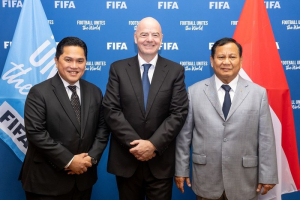New revision on IKN Law pave way for autocratic legalism, expert says
Legal expert of constitutional law, Herdiansyah Hamzah, expressed his strong criticism towards the inclusion of the "sweeping clause" in the amendments to the Capital City Law (IKN). This sweeping clause is seen as a shield for several provisions in the IKN Law that contradict other existing laws.
The sweeping clause referred to in the IKN Law is found in Article 42, Paragraph 1, Subsections a and b. These two articles stipulate that upon the enactment of the IKN Law, all provisions of legislation conflicting with the policies governing the preparation, development, and relocation of the Capital City, as well as the governance of the special administrative region of the Capital City, and regulations related to local governance, shall become null and void.
Herdiansyah argued that the government and the People's Consultative Assembly intentionally inserted this clause to legalize all provisions in the revised IKN Law, even if they contradict other laws.
Furthermore, he contends that these provisions were intentionally created to legitimize hidden detrimental provisions within the IKN Law, such as the disregard for land rights and favoritism towards investments.
The amendments to the IKN Law were ratified by the People's Consultative Assembly on Tuesday, October 3, 2023.
This approval had the support of seven parliamentary factions, including the Indonesian Democratic Party of Struggle (PDI Perjuangan), Golkar Party, Gerindra Party, NasDem Party, National Awakening Party, National Mandate Party, and the United Development Party.
Changes in the IKN Law
In these changes to the IKN Law, a total of 11 articles were modified, and six new articles were introduced. One of the amendments includes Article 12, which expands the authority of the IKN Authority from central government affairs to local governance.
Herdiansyah argues that the IKN Authority's jurisdiction was already ambiguous before the law revision. The IKN Authority was neither part of the central government nor the local government.
Furthermore, after the IKN Law was revised, the ambiguity surrounding the IKN Authority's powers worsened. This is because the IKN Authority was granted specific powers that contradict the principles of the Local Government Law.
He also questions the presence of Article 16A in the IKN Law, a new provision in the revised law that regulates the duration of land rights for investors, including land use rights, building use rights, and land usage rights.
Article 16A of the IKN Law states that land use rights can last up to 190 years, while building use rights and land usage rights can last up to 160 years. These provisions contradict the Basic Agrarian Law, which limits land use rights to a maximum of 60 years.
Herdiansyah believes that the provisions in Article 16A lack sufficient legal reasoning or ratio legis. According to him, the regulations in the IKN Law concerning land matters should adhere to the Basic Agrarian Law.
IKN Law already conflicting with other laws
In another context, Herlambang P. Wiratraman, a constitutional law expert at Gadjah Mada University, stated that many provisions in the IKN Law, even before the revision, were already in conflict with other laws.
One such issue pertains to the authority of the IKN Authority, and the revision of the law has only added more rules that contradict existing laws.
"Never before has there been a debate about what the special authority actually means. We still have an official government, but it seems like more authority is being granted," said Herlambang.
Herlambang also believes that the presence of Article 42, Paragraph 1, Subsections a and b, indicates that the government aims to revive autocratic legalism, which involves loosening constitutional constraints on the executive branch through legal reforms.
He argues that autocratic legalism can be identified through three aspects: firstly, a lack of public involvement in the legislative process; secondly, the appearance of proper legal formation, while in reality, it violates legal principles; and thirdly, a reckless and uncontrolled legislative process.
Tag
Already have an account? Sign In
-
Start reading
Freemium
-
Monthly Subscription
20% OFF$29.75
$37.19/MonthCancel anytime
This offer is open to all new subscribers!
Subscribe now -
Yearly Subscription
33% OFF$228.13
$340.5/YearCancel anytime
This offer is open to all new subscribers!
Subscribe now







